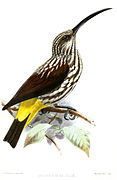List of sunbirds

Nectariniidae is a family of passerine birds in the superfamily Passeroidea, comprising the sunbirds and spiderhunters.[1] Members of Nectariniidae are also known as nectariniids.[2] Their range extends from the Afrotropics north to the Levant and southern Arabian Peninsula, and east through South and Southeast Asia up to New Guinea and northern Australia.[3] They inhabit a wide variety of habitats, from arid savannah to tropical rainforests, and can be found from sea level to an altitude of 4,900 m (16,100 ft). Sunbirds are generally small birds with long, thin, down-curved bills and brightly coloured, iridescent plumages.[2] They display marked sexual dimorphism, and males are much more visually striking than females, who are usually dull green, brown, or grey. The spiderhunters (Arachnothera) are larger than other sunbirds and show less sexual dimorphism.[3]
The primary threat facing sunbirds is habitat loss and degradation caused by deforestation due to agriculture.[2] Most species of sunbird are considered to be of Least Concern by the IUCN, although three species, the Amani sunbird, Loveridge's sunbird, and the elegant sunbird, are Endangered, and several others are considered Near Threatened or Vulnerable.
The exact delineation of sunbird species is somewhat contested and varies from authority to authority: the International Ornithologists' Union (IOU) recognizes 146 species of sunbirds in 16 genera,[1] while other authorities recognise 143–147 species.[4][5] The largest genera are Cinnyris and Aethopyga, with 53 and 23 species, respectively.[1] Recent phylogenetic studies indicate that several widespread species such as the olive-backed and black sunbirds may represent complexes of multiple cryptic species.[6] Several undescribed species of sunbird may also exist in Sierra Leone, Djibouti,[3] and Tanzania.[5]
Conventions[edit]
| Conservation status | |
|---|---|
| EX | Extinct (0 species) |
| EW | Extinct in the wild (0 species) |
| CR | Critically Endangered (0 species) |
| EN | Endangered (3 species) |
| VU | Vulnerable (4 species) |
| NT | Near threatened (7 species) |
| LC | Least concern (116 species) |
| Other categories | |
| DD | Data deficient (0 species) |
| NE | Not evaluated (16 species) |
Conservation status codes listed follow the International Union for Conservation of Nature (IUCN) Red List of Threatened Species. Range maps are provided wherever possible; if a range map is not available, a description of the sunbird's range is provided. Ranges are based on the IOC World Bird List for that species unless otherwise noted. Population estimates are of the number of mature individuals and are taken from the IUCN Red List.
This list follows the taxonomic treatment (designation and order of species) and nomenclature (scientific and common names) of version 13.2 of the IOC World Bird List.[1] Where the taxonomy proposed by the IOC World Bird List conflicts with the taxonomy followed by the IUCN[a] or the 2023 edition of The Clements Checklist of Birds of the World, the disagreement is noted next to the species's common name (for nomenclatural disagreements) or scientific name (for taxonomic disagreements).
Classification[edit]
The International Ornithologists' Union (IOU) recognizes 146 species of sunbirds in 16 genera;[1] other authorities recognise 143–147 species.[4][5] This list does not include hybrid species, extinct prehistoric species, or putative species not yet accepted by the IOU.
- Genus Chalcoparia: one species
- Genus Deleornis: two species
- Genus Anthreptes: fifteen species
- Genus Hedydipna: four species
- Genus Anabathmis: three species
- Genus Dreptes: one species
- Genus Anthobaphes: one species
- Genus Cyanomitra: seven species
- Genus Chalcomitra: seven species
- Genus Nectarinia: six species
- Genus Drepanorhynchus: one species
- Genus Cinnyris: fifty-three species
- Genus Aethopyga: twenty-two species
- Genus Kurochkinegramma: one species
- Genus Arachnothera: thirteen species
Nectariniids[edit]
| Common name | Scientific name and subspecies | Range | IUCN status and estimated population |
|---|---|---|---|
| Ruby-cheeked sunbird | C. singalensis (Gmelin, J. F., 1789) Eleven subspecies
|
South Asia, Indochina, Java, and Borneo[7] | LC
|
| Common name | Scientific name and subspecies | Range | IUCN status and estimated population |
|---|---|---|---|
| Fraser's sunbird | D. fraseri (Jardine & Selby, 1843) Three subspecies
|
West and Central Africa | LC
|
| Grey-headed sunbird | D. axillaris (Reichenow, 1893) |
Central Africa | LC
|
| Common name | Scientific name and subspecies | Range | IUCN status and estimated population |
|---|---|---|---|
| Plain-backed sunbird | A. reichenowi Gunning, 1909 Two subspecies
|
Disjunctly in coastal East Africa and western Southern Africa | NT
|
| Anchieta's sunbird | A. anchietae (Barboza du Bocage, 1878) |
Angola east to Tanzania and Mozambique | LC
|
| Plain sunbird | A. simplex (Müller, S., 1843) |
Malay Peninsula, Borneo, and Sumatra | LC
|
| Brown-throated sunbird | A. malacensis (Scopoli, 1786) Sixteen subspecies
|
Southeast Asia | LC
|
| Grey-throated sunbird | A. griseigularis Tweeddale, 1878 Two subspecies
|
Philippines | LC
|
| Red-throated sunbird | A. rhodolaemus Shelley, 1878 |
Malay Peninsula, Borneo, and Sumatra | NT
|
| Mangrove sunbird[b] | A. gabonicus (Hartlaub, 1861) |
West and Central Africa | LC
|
| Western violet-backed sunbird | A. longuemarei (Lesson, R. P., 1831) Three subspecies
|
Sub-Saharan Africa | LC
|
| Eastern violet-backed sunbird | A. orientalis Hartlaub, 1880 |
Horn of Africa south to Tanzania | LC
|
| Uluguru violet-backed sunbird | A. neglectus Neumann, 1922 |
East Africa | LC
|
| Violet-tailed sunbird | A. aurantius Verreaux, J. & Verreaux, É., 1851 |
Central Africa | LC
|
| Little green sunbird | A. seimundi (Ogilvie-Grant, 1908) Three subspecies
|
West Africa, Central Africa, and western East Africa | LC
|
| Yellow-chinned sunbird[c] | A. rectirostris[d] (Shaw, 1812) |
West Africa | LC
|
| Grey-chinned sunbird[e] | A. tephrolaemus[d] (Jardine & Fraser, 1852) |
Central Africa | LC
|
| Banded green sunbird[f] | A. rubritorques Reichenow, 1905 |
Tanzania | VU
|
| Common name | Scientific name and subspecies | Range | IUCN status and estimated population |
|---|---|---|---|
| Collared sunbird | H. collaris (Vieillot, 1819) Nine subspecies
|
Sub-Saharan Africa | LC
|
| Pygmy sunbird | H. platura (Vieillot, 1819) |
West and Central Africa | LC
|
| Nile Valley sunbird | H. metallica (Lichtenstein, M. H. C., 1823) |
Egypt south to Sudan and northern Horn of Africa, southwestern Arabian peninsula | LC
|
| Amani sunbird | H. pallidigaster (Sclater, W. L. & Moreau, 1935) |
Tanzania and southeastern Kenya | EN
|
| Common name | Scientific name and subspecies | Range | IUCN status and estimated population |
|---|---|---|---|
| Reichenbach's sunbird | A. reichenbachii (Hartlaub, 1857) |
Extreme southern West Africa east to Central Africa | LC
|
| Príncipe sunbird | A. hartlaubii (Hartlaub, 1857) |
Príncipe
|
LC
|
| Newton's sunbird | A. newtonii (Barboza du Bocage, 1887) |
São Tomé Island
|
LC
|
| Common name | Scientific name and subspecies | Range | IUCN status and estimated population |
|---|---|---|---|
| Giant sunbird[g] | D. thomensis (Barboza du Bocage, 1889) |
São Tomé Island
|
VU
|
| Common name | Scientific name and subspecies | Range | IUCN status and estimated population |
|---|---|---|---|
| Orange-breasted sunbird | A. violacea (Linnaeus, 1766) |
Southwestern South Africa | LC
|
| Common name | Scientific name and subspecies | Range | IUCN status and estimated population |
|---|---|---|---|
| Green-headed sunbird | C. verticalis (Latham, 1790) Four subspecies
|
West, Central, and East Africa | LC
|
| Bannerman's sunbird | C. bannermani Grant, C. H. B. & Mackworth-Praed, 1943 |
Central Africa | LC
|
| Blue-throated brown sunbird | C. cyanolaema (Jardine & Fraser, 1852) Three subspecies
|
West and Central Africa | LC
|
| Cameroon sunbird | C. oritis (Reichenow, 1892) Three subspecies
|
Western Cameroon, southeastern Nigeria, and Bioko | LC
|
| Blue-headed sunbird | C. alinae Jackson, F. J., 1904 Five subspecies
|
Eastern Rift Mountains | LC
|
| Olive sunbird | C. olivacea (Smith, A., 1840) Eleven subspecies
|
Sub-Saharan Africa south of the Sahel | LC
|
| Grey sunbird[h] | C. veroxii (Smith, A., 1832) Three subspecies
|
Coasts of East and Southern Africa | LC
|
| Common name | Scientific name and subspecies | Range | IUCN status and estimated population |
|---|---|---|---|
| Buff-throated sunbird | C. adelberti (Gervais, 1834) Two subspecies
|
West Africa | LC
|
| Carmelite sunbird | C. fuliginosa (Bechstein, 1811) Two subspecies
|
West and Central Africa | LC
|
| Green-throated sunbird | C. rubescens (Vieillot, 1819) Three subspecies
|
Central Africa | LC
|
| Amethyst sunbird | C. amethystina (Shaw, 1812) Four subspecies
|
Central, East, and Southern Africa | LC
|
| Scarlet-chested sunbird | C. senegalensis (Linnaeus, 1766) Six subspecies
|
Sub-Saharan Africa | LC
|
| Hunter's sunbird | C. hunteri (Shelley, 1889) |
Horn of Africa and East Africa | LC
|
| Socotra sunbird | C. balfouri (Sclater, P. L. & Hartlaub, 1881) |
Socotra | LC
|
| Common name | Scientific name and subspecies | Range | IUCN status and estimated population |
|---|---|---|---|
| Purple-rumped sunbird | L. zeylonica (Linnaeus, 1766) Two subspecies
|
Indian subcontinent | LC
|
| Crimson-backed sunbird | L. minima (Sykes, 1832) |
Southwestern India | LC
|
| Purple-throated sunbird | L. sperata[i] (Linnaeus, 1766) Four subspecies
|
Philippines | NE
|
| Van Hasselt's sunbird | L. brasiliana (Gmelin, J. F., 1788) Five subspecies
|
Eastern Indian subcontinent and Southeast Asia | LC
|
| Black sunbird | L. aspasia (Lesson, R. P. and Garnot, 1828) Twenty-one subspecies
|
Eastern Indonesia and Papua New Guinea | LC
|
| Copper-throated sunbird | L. calcostetha (Jardine, 1842) |
Southeast Asia | LC
|
| Common name | Scientific name and subspecies | Range | IUCN status and estimated population |
|---|---|---|---|
| Bocage's sunbird | N. bocagii Shelley, 1879 |
Democratic Republic of the Congo and Angola | LC
|
| Purple-breasted sunbird | N. purpureiventris (Reichenow, 1893) |
Albertine Rift Mountains | LC
|
| Tacazze sunbird | N. tacazze (Stanley, 1814) Two subspecies
|
Horn of Africa and East Africa | LC
|
| Bronzy sunbird[j] | N. kilimensis Shelley, 1885 Three subspecies
|
Central and East Africa | LC
|
| Malachite sunbird | N. famosa (Linnaeus, 1766) Two subspecies
|
East Africa and Southern Africa | LC
|
| Scarlet-tufted sunbird[k] | N. johnstoni Shelley, 1885 Four subspecies
|
East Africa | LC
|
| Common name | Scientific name and subspecies | Range | IUCN status and estimated population |
|---|---|---|---|
| Golden-winged sunbird | D. reichenowi Fischer, G. A., 1884 Three subspecies
|
East Africa
|
LC
|
| Common name | Scientific name and subspecies | Range | IUCN status and estimated population |
|---|---|---|---|
| Olive-bellied sunbird | C. chloropygius (Jardine, 1842) Three subspecies
|
West and Central Africa | LC
|
| Tiny sunbird | C. minullus Reichenow, 1899 |
West and Central Africa | LC
|
| Eastern Miombo sunbird | C. manoensis Reichenow, 1907 Two subspecies
|
East Africa | LC
|
| Western Miombo sunbird | C. gertrudis Grote, 1926 |
Central and East Africa | LC
|
| Southern double-collared sunbird | C. chalybeus (Linnaeus, 1766) Two subspecies
|
Southern Africa | LC
|
| Neergaard's sunbird | C. neergaardi Grant, C. H. B., 1908 |
Southern Africa | NT
|
| Rwenzori double-collared sunbird[l] | C. stuhlmanni Reichenow, 1893 Four subspecies
|
Eastern Rift Mountains | LC
|
| Whyte's double-collared sunbird | C. whytei[m] Benson, 1948 Two subspecies
|
East Africa | NE
|
| Prigogine's double-collared sunbird | C. prigoginei MacDonald, 1958 |
Southeastern Democratic Republic of the Congo | NT
|
| Ludwig's double-collared sunbird | C. ludovicensis[m] (Barboza du Bocage, 1868) |
Angola | NE
|
| Northern double-collared sunbird | C. reichenowi Sharpe, 1891 Two subspecies
|
Western Central Africa and East Africa | LC
|
| Greater double-collared sunbird | C. afer (Linnaeus, 1766) |
Southern Africa | LC
|
| Regal sunbird | C. regius Reichenow, 1893 Two subspecies
|
Albertine Rift Valley | LC
|
| Rockefeller's sunbird | C. rockefelleri Chapin, 1932 |
Eastern Democratic Republic of the Congo | VU
|
| Eastern double-collared sunbird | C. mediocris Shelley, 1885 |
Kenya and Tanzania | LC
|
| Usambara double-collared sunbird | C. usambaricus Grote, 1922 |
Southeast Kenya and northeast Tanzania | NT
|
| Forest double-collared sunbird | C. fuelleborni Reichenow, 1899 Two subspecies
|
East Africa | LC
|
| Moreau's sunbird | C. moreaui Sclater, W. L., 1933 |
Central Tanzania | NT
|
| Loveridge's sunbird | C. loveridgei Hartert, E. J. O., 1922 |
Eastern central Tanzania | EN
|
| Beautiful sunbird | C. pulchellus[n] (Linnaeus, 1766) Two subspecies
|
West, Central, and East Africa | NE
|
| Marico sunbird | C. mariquensis Smith, A., 1836 Three subspecies
|
East and Southern Africa | LC
|
| Shelley's sunbird | C. shelleyi[o] Alexander, 1899 |
East Africa | NE
|
| Hofmann's sunbird | C. hofmanni[o] Reichenow, 1915 |
Eastern Tanzania | NE
|
| Congo sunbird | C. congensis (van Oort, 1910) |
Congo Basin | LC
|
| Red-chested sunbird | C. erythrocercus (Hartlaub, 1857) |
Exterme southern Sudan to central Tanzania | LC
|
| Black-bellied sunbird | C. nectarinioides Richmond, 1897 Two subspecies
|
East Africa | LC
|
| Purple-banded sunbird | C. bifasciatus (Shaw, 1812) Two subspecies
|
East, Central, and Southern Africa | LC
|
| Tsavo sunbird | C. tsavoensis van Someren, 1922 |
Kenya and northeastern Tanzania | LC
|
| Violet-breasted sunbird | C. chalcomelas Reichenow, 1905 |
Somalia and Kenya | LC
|
| Pemba sunbird | C. pembae Reichenow, 1905 |
Pemba Island
|
LC
|
| Orange-tufted sunbird | C. bouvieri Shelley, 1877 |
Central Africa | LC
|
| Palestine sunbird | C. osea Bonaparte, 1856 Two subspecies
|
Arabian Peninsula and Central Africa | LC
|
| Arabian sunbird | C. hellmayri[p] Neumann, 1904 Two subspecies
|
Arabian Peninsula | NE
|
| Shining sunbird | C. habessinicus[p] (Hemprich & Ehrenberg, 1828) Three subspecies
|
East Africa | NE
|
| Splendid sunbird | C. coccinigastrus (Latham, 1801) |
West and Central Africa | LC
|
| Johanna's sunbird | C. johannae Verreaux, J. & Verreaux, É., 1851 Two subspecies
|
West and Central Africa | LC
|
| Superb sunbird | C. superbus (Shaw, 1812) Four subspecies
|
West and Central Africa | LC
|
| Rufous-winged sunbird | C. rufipennis (Jensen, 1983) |
Central Tanzania | VU
|
| Oustalet's sunbird | C. oustaleti (Barboza du Bocage, 1878) Two subspecies
|
Disjunctly, in Angola, and in Tanzania and Zambia | LC
|
| White-bellied sunbird | C. talatala Smith, A., 1836 |
Southern Africa | LC
|
| Variable sunbird | C. venustus (Shaw, 1799) Five subspecies
|
West, Central, and East Africa | LC
|
| Dusky sunbird | C. fuscus Vieillot, 1819 Two subspecies
|
Southwestern Africa | LC
|
| Ursula's sunbird | C. ursulae (Alexander, 1903) |
Cameroon | LC
|
| Bates's sunbird | C. batesi Ogilvie-Grant, 1908 |
West and Central Africa | LC
|
| Copper sunbird | C. cupreus (Shaw, 1812) Two subspecies
|
West, Central, and East Africa | LC
|
| Purple sunbird | C. asiaticus (Latham, 1790) Thre subspecies
|
Eastern Arabian Peninsula east to South Asia and Indochina | LC
|
| Olive-backed sunbird | C. jugularis[q] (Linnaeus, 1766) Twenty-one subspecies
|
Southeast Asia to Papua New Guinea and northern Australia | NE
|
| Apricot-breasted sunbird | C. buettikoferi Hartert, E. J. O., 1896 |
Sumba
|
LC
|
| Flame-breasted sunbird | C. solaris (Temminck, 1825) Two subspecies
|
Lesser Sunda Islands and Wetar | LC
|
| Souimanga sunbird | C. sovimanga (Gmelin, J. F., 1788) Five subspecies
|
Madagascar and Seychelles | LC
|
| Malagasy green sunbird[r] | C. notatus[s] (Müller, P. L. S., 1776) Three subspecies
|
Madagascar and Comoros | NE
|
| Seychelles sunbird | C. dussumieri (Hartlaub, 1861) |
Seychelles | LC
|
| Humblot's sunbird | C. humbloti Milne-Edwards, A. & Oustalet, 1885 Two subspecies
|
Grande Comore and Mohéli | LC
|
| Anjouan sunbird | C. comorensis Peters, W., 1864 |
Anjouan | LC
|
| Mayotte sunbird | C. coquerellii (Hartlaub, 1860) |
Mayotte
|
LC
|
| Loten's sunbird | C. lotenius (Linnaeus, 1766) Two subspecies
|
India and Sri Lanka | LC
|
| Common name | Scientific name and subspecies | Range | IUCN status and estimated population |
|---|---|---|---|
| Grey-hooded sunbird | A. primigenia (Hachisuka, 1941) Two subspecies
|
Mindanao | LC
|
| Apo sunbird | A. boltoni[t] Mearns, 1905 Three subspecies
|
Mindanao | LC
|
| Lina's sunbird | A. linaraborae Kennedy, R. S., Gonzales & Miranda, 1997 |
Mindanao | NT
|
| Flaming sunbird | A. flagrans Oustalet, 1876 |
Luzon and Catanduanes | LC
|
| Maroon-naped sunbird | A. guimarasensis (Steere, 1890) Two subspecies
|
Negros, Panay, and Guimaras | LC
|
| Metallic-winged sunbird | A. pulcherrima[u] Sharpe, 1876 |
Central and southern Philippines | NE
|
| Luzon sunbird | A. jefferyi[u] (Ogilvie-Grant, 1894) |
Luzon | NE
|
| Bohol sunbird | A. decorosa[u] (McGregor, 1907) |
Bohol | NE
|
| Elegant sunbird | A. duyvenbodei (Schlegel, 1871) |
Sangihe Islands | EN
|
| Lovely sunbird | A. shelleyi Sharpe, 1876 |
Palawan archipelago | LC
|
| Handsome sunbird | A. bella Tweeddale, 1877 Six subspecies
|
Philippines | LC
|
| Mrs. Gould's sunbird | A. gouldiae (Vigors, 1831) Four subspecies
|
Indochina, southern China, and Himalayan foothills | LC
|
| Green-tailed sunbird | A. nipalensis (Hodgson, 1836) Nine subspecies
|
Indochina, southern China, and Himalayan foothills | LC
|
| White-flanked sunbird | A. eximia (Horsfield, 1821) |
Java | LC
|
| Fork-tailed sunbird | A. christinae[v] Swinhoe, 1869 Three subspecies
|
China, Vietnam, and Laos | NE
|
| Black-throated sunbird | A. saturata (Hodgson, 1836) Ten subspecies
|
Indochina, southern China, and Himalayan foothills | LC
|
| Crimson sunbird | A. siparaja (Raffles, 1822) Fourteen subspecies
|
South Asia, Southeast Asia, and southern China | LC
|
| Magnificent sunbird | A. magnifica Sharpe, 1876 |
Western and Central Visayas | LC
|
| Vigors's sunbird | A. vigorsii (Sykes, 1832) |
Western India | LC
|
| Javan sunbird | A. mystacalis (Temminck, 1822) |
Java | LC
|
| Temminck's sunbird | A. temminckii (Müller, S., 1843) |
Malay Peninsula, Sumatra, and Borneo | LC
|
| Fire-tailed sunbird | A. ignicauda (Hodgson, 1836) Two subspecies
|
Himalayas | LC
|
| Common name | Scientific name and subspecies | Range | IUCN status and estimated population |
|---|---|---|---|
| Purple-naped sunbird | K. hypogrammicum (Müller, S., 1843) Five subspecies
|
Indochina, Borneo, and Sumatra | LC
|
| Common name | Scientific name and subspecies | Range | IUCN status and estimated population |
|---|---|---|---|
| Little spiderhunter | A. longirostra (Latham, 1790) Ten subspecies
|
South and Southeast Asia | LC
|
| Orange-tufted spiderhunter | A. flammifera Tweeddale, 1878 Two subspecies
|
Philippines | LC
|
| Pale spiderhunter | A. dilutior Sharpe, 1876 |
Palawan | LC
|
| Thick-billed spiderhunter | A. crassirostris (Reichenbach, 1853) |
Malay Peninsula, Sumatra, and Borneo | LC
|
| Long-billed spiderhunter | A. robusta Müller, S. & Schlegel, 1844 Two subspecies
|
Malay Peninsula, Sumatra, Java, and Borneo | LC
|
| Spectacled spiderhunter | A. flavigaster (Eyton, 1839) |
Malay Peninsula, Sumatra, and Borneo | LC
|
| Yellow-eared spiderhunter | A. chrysogenys (Temminck, 1826) Two subspecies
|
Malay Peninsula, Sumatra, Java, and Borneo | LC
|
| Naked-faced spiderhunter | A. clarae Blasius, W., 1890 Four subspecies
|
Philippines | LC
|
| Gray-breasted spiderhunter | A. modesta (Eyton, 1839) Three subspecies
|
Malay Peninsula, Sumatra, and Borneo | LC
|
| Streaky-breasted spiderhunter | A. affinis (Horsfield, 1821) |
Java and Bali | LC
|
| Bornean spiderhunter | A. everetti[w] (Sharpe, 1893) |
Borneo | NE
|
| Streaked spiderhunter | A. magna[w] (Hodgson, 1836) Five subspecies
|
Eastern Indian subcontinent and Indochina | NE
|
| Whitehead's spiderhunter | A. juliae Sharpe, 1887 |
Borneo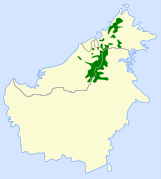
|
LC
|
Notes[edit]
- ^ The IUCN follows the taxonomy proposed by the HBW and BirdLife Taxonomic Checklist.[4]
- ^ Called mouse-brown sunbird by The Clements Checklist.[5]
- ^ Called yellow-throated sunbird by The Clements Checklist.[5]
- ^ a b The yellow-chinned and grey-chinned sunbirds are treated as a single species, the green sunbird, by the Clements Checklist.[5]
- ^ Called gray-throated sunbird by The Clements Checklist.[5]
- ^ Called banded sunbird by The Clements Checklist.[5]
- ^ Called São Tomé sunbird by The Clements Checklist.[5]
- ^ Called mouse-colored sunbird by The Clements Checklist.[5]
- ^ The IUCN splits the purple-throated sunbird sensu lato into two species, the purple-throated sunbird sensu stricto (L. sperata) and the orange-lined sunbird (L. juliae).[4]
- ^ Called bronze sunbird by The Clements Checklist and the IUCN.[5]
- ^ Called red-tufted sunbird by The Clements Checklist and the IUCN.[5]
- ^ Called Stuhlmann's sunbird by The Clements Checklist and the Ruwenzori sunbird by the IUCN.[5]
- ^ a b Whyte's double-collared sunbird and Ludwig's double-collared sunbird are treated as a single species, the montane double-collared sunbird, by the IUCN and Clements.[4][5]
- ^ The IUCN splits the beautiful sunbird sensu lato into two species, the gorgeous sunbird (C. melanogastrus) and beautiful sunbird sensu stricto (C. pulchellus).[4]
- ^ a b Hofmann's sunbird is considered a subspecies of Shelley's sunbird by the IUCN and Clements.[4][5]
- ^ a b The Arabian sunbird is treated as a subspecies of the shining sunbird by the Clement's Checklist.[5]
- ^ The IUCN splits the olive-backed sunbird sensu lato into two species, Rand's sunbird (C. idenburgi) and olive-backed sunbird sensu stricto (C. jugularis),[4] while The Clements Checklist splits it into eight different species.[5]
- ^ Called Malagasy sunbird by The Clements Checklist.[5]
- ^ The IUCN splits the Malagasy green sunbird into three species, the long-billed sunbird (C. notatus), Grand Comoro sunbird (C. moebii), and Moheli sunbird (C. voeltzkowi).[4]
- ^ The Clement's Checklist splits the Apo sunbird sensu lato into two species, Tboli sunbird (A. tibolii) and Apo sunbird sensu stricto (A. malindangensis).[5]
- ^ a b c The Bohol and Luzon sunbirds are treated as a subspecies of the metallic-winged sunbird by the IUCN and Clements.[4][5]
- ^ The IUCN splits the fork-tailed sunbird sensu lato into two species, the Hainan sunbird (A. christinae) and fork-tailed sunbird sensu stricto (A. latouchii).[4]
- ^ a b The Bornean spiderhunter is treated as a subspecies of the streaked spiderhunter by the IUCN.[4]
References[edit]
- ^ a b c d e Gill, F.; Donsker, D.; Rasmussen, P., eds. (July 2023). "Dippers, leafbirds, flowerpeckers, sunbirds". IOC World Bird List. v 13.2. Archived from the original on October 23, 2021. Retrieved October 3, 2023.
- ^ a b c Winkler, David W.; Billerman, Shawn M.; Lovette, Irby J. (March 4, 2020). Billerman, Shawn M.; Keeney, Brooke K.; Rodewald, Paul G.; Schulenberg, Thomas S. (eds.). "Sunbirds and Spiderhunters (Nectariniidae)". Birds of the World. Cornell Lab of Ornithology. doi:10.2173/bow.nectar1.01. S2CID 216264284. Retrieved May 25, 2023.
- ^ a b c Cheke, Robert A.; Mann, Clive F. (2010). Sunbirds: A Guide to the Sunbirds, Flowerpeckers, Spiderhunters and Sugarbirds of the World. London: Christopher Helm. ISBN 978-1-4081-3567-9. Archived from the original on October 7, 2023. Retrieved July 10, 2023.
- ^ a b c d e f g h i j k l "Handbook of the Birds of the World and BirdLife International digital checklist of the birds of the world. Version 7". HBW and BirdLife International. 2022. Archived from the original on December 8, 2023. Retrieved June 9, 2023.
- ^ a b c d e f g h i j k l m n o p q r s t Clements, James F.; Rasmussen, P. C.; Schulenberg, T. S.; Iliff, M. J.; Fredericks, T. A.; Gerbracht, J. A.; Lepage, Denis; Billerman, S. M.; Sullivan, B. L.; Wood, C. L. (2023). "The eBird/Clements checklist of Birds of the World: v2023". Clements Checklist. Archived from the original on January 1, 2020. Retrieved October 30, 2023.
- ^ Ó Marcaigh, Fionn; Kelly, David J; O’Connell, Darren P; Analuddin, Kangkuso; Karya, Adi; McCloughan, Jennifer; Tolan, Ellen; Lawless, Naomi; Marples, Nicola M (May 5, 2023). "Small islands and large biogeographic barriers have driven contrasting speciation patterns in Indo-Pacific sunbirds (Aves: Nectariniidae)". Zoological Journal of the Linnean Society. 198 (1): 72–92. doi:10.1093/zoolinnean/zlac081. hdl:2262/101492. ISSN 0024-4082. Archived from the original on June 12, 2023. Retrieved June 14, 2023.
- ^ Karuthedathu, Dipu; Das, Vinay; J., Praveen; Ramachandran, Vijay; Shurpali, Sachin; Nair, Manoj V. (January 17, 2014). "Some significant avian records from Odisha" (PDF). Indian Birds. 9 (1): 16. Archived (PDF) from the original on May 25, 2023. Retrieved June 14, 2023.
- ^ BirdLife International (2016). "Chalcoparia singalensis". IUCN Red List of Threatened Species. 2016: e.T22717626A94542835. doi:10.2305/IUCN.UK.2016-3.RLTS.T22717626A94542835.en. Retrieved October 3, 2023.
- ^ BirdLife International (2016). "Deleornis fraseri". IUCN Red List of Threatened Species. 2016: e.T103792577A94541369. doi:10.2305/IUCN.UK.2016-3.RLTS.T103792577A94541369.en. Retrieved October 3, 2023.
- ^ BirdLife International (2016). "Deleornis axillaris". IUCN Red List of Threatened Species. 2016: e.T103792599A104232364. doi:10.2305/IUCN.UK.2016-3.RLTS.T103792599A104232364.en. Retrieved October 3, 2023.
- ^ BirdLife International (2016). "Anthreptes reichenowi". IUCN Red List of Threatened Species. 2016: e.T22717602A94541610. doi:10.2305/IUCN.UK.2016-3.RLTS.T22717602A94541610.en. Retrieved October 3, 2023.
- ^ BirdLife International (2016). "Anthreptes anchietae". IUCN Red List of Threatened Species. 2016: e.T22717606A94541876. doi:10.2305/IUCN.UK.2016-3.RLTS.T22717606A94541876.en. Retrieved October 3, 2023.
- ^ BirdLife International (2016). "Anthreptes simplex". IUCN Red List of Threatened Species. 2016: e.T22717611A94542063. doi:10.2305/IUCN.UK.2016-3.RLTS.T22717611A94542063.en. Retrieved October 3, 2023.
- ^ BirdLife International (2016). "Anthreptes malacensis". IUCN Red List of Threatened Species. 2016: e.T103792612A94542270. doi:10.2305/IUCN.UK.2016-3.RLTS.T103792612A94542270.en. Retrieved October 3, 2023.
- ^ BirdLife International (2016). "Anthreptes griseigularis". IUCN Red List of Threatened Species. 2016: e.T103792631A104295009. doi:10.2305/IUCN.UK.2016-3.RLTS.T103792631A104295009.en. Retrieved October 3, 2023.
- ^ BirdLife International (2016). "Anthreptes rhodolaemus". IUCN Red List of Threatened Species. 2016: e.T22717618A94542527. doi:10.2305/IUCN.UK.2016-3.RLTS.T22717618A94542527.en. Retrieved October 3, 2023.
- ^ BirdLife International (2018). "Anthreptes gabonicus". IUCN Red List of Threatened Species. 2018: e.T22717629A131977277. doi:10.2305/IUCN.UK.2018-2.RLTS.T22717629A131977277.en. Retrieved October 3, 2023.
- ^ BirdLife International (2016). "Anthreptes longuemarei". IUCN Red List of Threatened Species. 2016: e.T22717635A94543374. doi:10.2305/IUCN.UK.2016-3.RLTS.T22717635A94543374.en. Retrieved October 3, 2023.
- ^ BirdLife International (2016). "Anthreptes orientalis". IUCN Red List of Threatened Species. 2016: e.T22717640A94543716. doi:10.2305/IUCN.UK.2016-3.RLTS.T22717640A94543716.en. Retrieved October 3, 2023.
- ^ BirdLife International (2016). "Anthreptes neglectus". IUCN Red List of Threatened Species. 2016: e.T22717645A94543945. doi:10.2305/IUCN.UK.2016-3.RLTS.T22717645A94543945.en. Retrieved October 3, 2023.
- ^ BirdLife International (2016). "Anthreptes aurantius". IUCN Red List of Threatened Species. 2016: e.T22717649A94544121. doi:10.2305/IUCN.UK.2016-3.RLTS.T22717649A94544121.en. Retrieved October 3, 2023.
- ^ BirdLife International (2018). "Anthreptes seimundi". IUCN Red List of Threatened Species. 2018: e.T22717683A131977855. doi:10.2305/IUCN.UK.2018-2.RLTS.T22717683A131977855.en. Retrieved October 3, 2023.
- ^ BirdLife International (2022). "Anthreptes rectirostris". IUCN Red List of Threatened Species. 2022: e.T103792746A210661407. doi:10.2305/IUCN.UK.2022-1.RLTS.T103792746A210661407.en. Retrieved October 3, 2023.
- ^ BirdLife International (2016). "Anthreptes tephrolaemus". IUCN Red List of Threatened Species. 2016: e.T103792796A104295279. doi:10.2305/IUCN.UK.2016-3.RLTS.T103792796A104295279.en. Retrieved October 3, 2023.
- ^ BirdLife International (2017). "Anthreptes rubritorques". IUCN Red List of Threatened Species. 2017: e.T22717663A118905827. doi:10.2305/IUCN.UK.2017-3.RLTS.T22717663A118905827.en. Retrieved October 3, 2023.
- ^ BirdLife International (2016). "Hedydipna collaris". IUCN Red List of Threatened Species. 2016: e.T22717668A94545190. doi:10.2305/IUCN.UK.2016-3.RLTS.T22717668A94545190.en. Retrieved November 11, 2021.
- ^ BirdLife International (2018). "Hedydipna platura". IUCN Red List of Threatened Species. 2018: e.T22717672A131977543. doi:10.2305/IUCN.UK.2018-2.RLTS.T22717672A131977543.en. Retrieved November 13, 2021.
- ^ BirdLife International (2016). "Hedydipna metallica". IUCN Red List of Threatened Species. 2016: e.T22717676A94545911. doi:10.2305/IUCN.UK.2016-3.RLTS.T22717676A94545911.en. Retrieved November 13, 2021.
- ^ BirdLife International (2021). "Hedydipna pallidigaster". IUCN Red List of Threatened Species. 2021: e.T22717653A180120536. doi:10.2305/IUCN.UK.2021-3.RLTS.T22717653A180120536.en. Retrieved October 3, 2023.
- ^ BirdLife International (2016). "Anabathmis reichenbachii". IUCN Red List of Threatened Species. 2016: e.T22717705A94547607. doi:10.2305/IUCN.UK.2016-3.RLTS.T22717705A94547607.en. Retrieved November 17, 2021.
- ^ BirdLife International (2018). "Anabathmis hartlaubii". IUCN Red List of Threatened Species. 2018: e.T22717709A131458593. doi:10.2305/IUCN.UK.2018-2.RLTS.T22717709A131458593.en. Retrieved November 16, 2021.
- ^ BirdLife International (2018). "Anabathmis newtonii". IUCN Red List of Threatened Species. 2018: e.T22717714A131458327. doi:10.2305/IUCN.UK.2018-2.RLTS.T22717714A131458327.en. Retrieved November 17, 2021.
- ^ BirdLife International (2018). "Dreptes thomensis". IUCN Red List of Threatened Species. 2018: e.T22717719A132236453. doi:10.2305/IUCN.UK.2018-2.RLTS.T22717719A132236453.en. Retrieved November 17, 2021.
- ^ BirdLife International (2016). "Anthobaphes violacea". IUCN Red List of Threatened Species. 2016: e.T22717695A94547235. doi:10.2305/IUCN.UK.2016-3.RLTS.T22717695A94547235.en. Retrieved November 12, 2021.
- ^ BirdLife International (2016). "Cyanomitra verticalis". IUCN Red List of Threatened Species. 2016: e.T22717738A94548805. doi:10.2305/IUCN.UK.2016-3.RLTS.T22717738A94548805.en. Retrieved November 17, 2021.
- ^ BirdLife International (2018). "Cyanomitra cyanolaema". IUCN Red List of Threatened Species. 2018: e.T22717746A131978715. doi:10.2305/IUCN.UK.2018-2.RLTS.T22717746A131978715.en. Retrieved November 12, 2021.
- ^ BirdLife International (2016). "Cyanomitra oritis". IUCN Red List of Threatened Species. 2016: e.T22717728A94548457. doi:10.2305/IUCN.UK.2016-3.RLTS.T22717728A94548457.en. Retrieved November 12, 2021.
- ^ BirdLife International (2018). "Cyanomitra alinae". IUCN Red List of Threatened Species. 2018: e.T22717733A131978531. doi:10.2305/IUCN.UK.2018-2.RLTS.T22717733A131978531.en. Retrieved November 13, 2021.
- ^ BirdLife International (2018). "Cyanomitra olivacea". IUCN Red List of Threatened Species. 2018: e.T22717691A131978137. doi:10.2305/IUCN.UK.2018-2.RLTS.T22717691A131978137.en. Retrieved November 13, 2021.
- ^ BirdLife International (2016). "Cyanomitra verreauxii". IUCN Red List of Threatened Species. 2016: e.T22717699A94547409. doi:10.2305/IUCN.UK.2016-3.RLTS.T22717699A94547409.en. Retrieved November 12, 2021.
- ^ BirdLife International (2016). "Chalcomitra adelberti". IUCN Red List of Threatened Species. 2016: e.T22717778A94551393. doi:10.2305/IUCN.UK.2016-3.RLTS.T22717778A94551393.en. Retrieved November 13, 2021.
- ^ BirdLife International (2018). "Chalcomitra fuliginosa". IUCN Red List of Threatened Species. 2018: e.T22717758A131979010. doi:10.2305/IUCN.UK.2018-2.RLTS.T22717758A131979010.en. Retrieved November 12, 2021.
- ^ BirdLife International (2016). "Chalcomitra rubescens". IUCN Red List of Threatened Species. 2016: e.T22717766A94550517. doi:10.2305/IUCN.UK.2016-3.RLTS.T22717766A94550517.en. Retrieved November 12, 2021.
- ^ BirdLife International (2016). "Chalcomitra amethystina". IUCN Red List of Threatened Species. 2016: e.T22717762A94550241. doi:10.2305/IUCN.UK.2016-3.RLTS.T22717762A94550241.en. Retrieved November 17, 2021.
- ^ BirdLife International (2018). "Chalcomitra senegalensis". IUCN Red List of Threatened Species. 2018: e.T22717770A131979279. doi:10.2305/IUCN.UK.2018-2.RLTS.T22717770A131979279.en. Retrieved November 11, 2021.
- ^ BirdLife International (2016). "Chalcomitra hunteri". IUCN Red List of Threatened Species. 2016: e.T22717774A94551180. doi:10.2305/IUCN.UK.2016-3.RLTS.T22717774A94551180.en. Retrieved November 12, 2021.
- ^ BirdLife International (2016). "Chalcomitra balfouri". IUCN Red List of Threatened Species. 2016: e.T22717750A94549624. doi:10.2305/IUCN.UK.2016-3.RLTS.T22717750A94549624.en. Retrieved February 19, 2021.
- ^ BirdLife International (2016). "Leptocoma zeylonica". IUCN Red List of Threatened Species. 2016: e.T22717782A94551632. doi:10.2305/IUCN.UK.2016-3.RLTS.T22717782A94551632.en. Retrieved November 12, 2021.
- ^ BirdLife International (2020). "Leptocoma minima". IUCN Red List of Threatened Species. 2020: e.T22717785A94551846. Retrieved November 6, 2021.
- ^ BirdLife International (2016). "Leptocoma brasiliana". IUCN Red List of Threatened Species. 2016: e.T103795247A104297009. doi:10.2305/IUCN.UK.2016-3.RLTS.T103795247A104297009.en. Retrieved November 18, 2021.
- ^ BirdLife International (2018). "Leptocoma aspasia". IUCN Red List of Threatened Species. 2018: e.T22717791A132114755. doi:10.2305/IUCN.UK.2018-2.RLTS.T22717791A132114755.en. Retrieved November 18, 2021.
- ^ BirdLife International (2016). "Leptocoma calcostetha". IUCN Red List of Threatened Species. 2016: e.T22717794A94552451. doi:10.2305/IUCN.UK.2016-3.RLTS.T22717794A94552451.en. Retrieved November 12, 2021.
- ^ BirdLife International (2016). "Nectarinia bocagii". IUCN Red List of Threatened Species. 2016: e.T22717966A94560196. doi:10.2305/IUCN.UK.2016-3.RLTS.T22717966A94560196.en. Retrieved November 11, 2021.
- ^ BirdLife International (2016). "Nectarinia purpureiventris". IUCN Red List of Threatened Species. 2016: e.T22717962A94560024. doi:10.2305/IUCN.UK.2016-3.RLTS.T22717962A94560024.en. Retrieved November 12, 2021.
- ^ BirdLife International (2016). "Nectarinia tacazze". IUCN Red List of Threatened Species. 2016: e.T22717958A94559801. doi:10.2305/IUCN.UK.2016-3.RLTS.T22717958A94559801.en. Retrieved November 12, 2021.
- ^ BirdLife International (2016). "Nectarinia kilimensis". IUCN Red List of Threatened Species. 2016: e.T22717970A94560374. doi:10.2305/IUCN.UK.2016-3.RLTS.T22717970A94560374.en. Retrieved November 13, 2021.
- ^ BirdLife International (2018). "Nectarinia famosa". IUCN Red List of Threatened Species. 2018: e.T22717979A132114939. doi:10.2305/IUCN.UK.2018-2.RLTS.T22717979A132114939.en. Retrieved November 12, 2021.
- ^ BirdLife International (2018). "Nectarinia johnstoni". IUCN Red List of Threatened Species. 2018: e.T22717984A132115208. doi:10.2305/IUCN.UK.2018-2.RLTS.T22717984A132115208.en. Retrieved November 12, 2021.
- ^ BirdLife International (2018). "Drepanorhynchus reichenowi". IUCN Red List of Threatened Species. 2018: e.T22717975A131981080. doi:10.2305/IUCN.UK.2018-2.RLTS.T22717975A131981080.en. Retrieved November 13, 2021.
- ^ BirdLife International (2016). "Cinnyris chloropygius". IUCN Red List of Threatened Species. 2016: e.T22717919A94557353. doi:10.2305/IUCN.UK.2016-3.RLTS.T22717919A94557353.en. Retrieved November 12, 2021.
- ^ BirdLife International (2018). "Cinnyris minullus". IUCN Red List of Threatened Species. 2018: e.T22717923A131980390. doi:10.2305/IUCN.UK.2018-2.RLTS.T22717923A131980390.en. Retrieved November 11, 2021.
- ^ BirdLife International (2016). "Cinnyris manoensis". IUCN Red List of Threatened Species. 2016: e.T103797506A94556226. doi:10.2305/IUCN.UK.2016-3.RLTS.T103797506A94556226.en. Retrieved November 13, 2021.
- ^ BirdLife International (2016). "Cinnyris gertrudis". IUCN Red List of Threatened Species. 2016: e.T103797518A104294788. doi:10.2305/IUCN.UK.2016-3.RLTS.T103797518A104294788.en. Retrieved November 12, 2021.
- ^ BirdLife International (2018). "Cinnyris chalybeus". IUCN Red List of Threatened Species. 2018: e.T22717869A131979925. doi:10.2305/IUCN.UK.2018-2.RLTS.T22717869A131979925.en. Retrieved November 20, 2021.
- ^ BirdLife International (2018). "Cinnyris neergaardi". IUCN Red List of Threatened Species. 2018: e.T22717903A131980130. doi:10.2305/IUCN.UK.2018-2.RLTS.T22717903A131980130.en. Retrieved November 12, 2021.
- ^ BirdLife International (2016). "Cinnyris stuhlmanni". IUCN Red List of Threatened Species. 2016: e.T103798409A104275812. doi:10.2305/IUCN.UK.2016-3.RLTS.T103798409A104275812.en. Retrieved November 18, 2021.
- ^ BirdLife International (2016). "Cinnyris prigoginei". IUCN Red List of Threatened Species. 2016: e.T103798427A104275573. doi:10.2305/IUCN.UK.2016-3.RLTS.T103798427A104275573.en. Retrieved November 18, 2021.
- ^ BirdLife International (2016). "Cinnyris reichenowi". IUCN Red List of Threatened Species. 2016: e.T22717887A94556635. doi:10.2305/IUCN.UK.2016-3.RLTS.T22717887A94556635.en. Retrieved November 11, 2021.
- ^ BirdLife International (2016). "Cinnyris afer". IUCN Red List of Threatened Species. 2016: e.T103798399A94556884. doi:10.2305/IUCN.UK.2016-3.RLTS.T103798399A94556884.en. Retrieved November 11, 2021.
- ^ BirdLife International (2016). "Cinnyris regius". IUCN Red List of Threatened Species. 2016: e.T22717927A94557969. doi:10.2305/IUCN.UK.2016-3.RLTS.T22717927A94557969.en. Retrieved November 11, 2021.
- ^ BirdLife International (2016). "Cinnyris rockefelleri". IUCN Red List of Threatened Species. 2016: e.T22717941A94558639. doi:10.2305/IUCN.UK.2016-3.RLTS.T22717941A94558639.en. Retrieved November 12, 2021.
- ^ BirdLife International (2016). "Cinnyris mediocris". IUCN Red List of Threatened Species. 2016: e.T103799498A95119695. doi:10.2305/IUCN.UK.2016-3.RLTS.T103799498A95119695.en. Retrieved November 17, 2021.
- ^ BirdLife International (2016). "Cinnyris usambaricus". IUCN Red List of Threatened Species. 2016: e.T103799620A104276065. doi:10.2305/IUCN.UK.2016-3.RLTS.T103799620A104276065.en. Retrieved November 13, 2021.
- ^ BirdLife International (2016). "Cinnyris fuelleborni". IUCN Red List of Threatened Species. 2016: e.T22735340A95108399. doi:10.2305/IUCN.UK.2016-3.RLTS.T22735340A95108399.en. Retrieved November 12, 2021.
- ^ BirdLife International (2016). "Cinnyris moreaui". IUCN Red List of Threatened Species. 2016: e.T22717936A94558420. doi:10.2305/IUCN.UK.2016-3.RLTS.T22717936A94558420.en. Retrieved November 12, 2021.
- ^ BirdLife International (2021). "Cinnyris loveridgei". IUCN Red List of Threatened Species. 2021: e.T22717931A179267691. doi:10.2305/IUCN.UK.2021-3.RLTS.T22717931A179267691.en. Retrieved November 11, 2021.
- ^ BirdLife International (2018). "Cinnyris mariquensis". IUCN Red List of Threatened Species. 2018: e.T22718003A131882840. doi:10.2305/IUCN.UK.2018-2.RLTS.T22718003A131882840.en. Retrieved November 11, 2021.
- ^ BirdLife International (2016). "Cinnyris congensis". IUCN Red List of Threatened Species. 2016: e.T22717998A94561701. doi:10.2305/IUCN.UK.2016-3.RLTS.T22717998A94561701.en. Retrieved November 15, 2021.
- ^ BirdLife International (2018). "Cinnyris erythrocercus". IUCN Red List of Threatened Species. 2018: e.T22717994A131981463. doi:10.2305/IUCN.UK.2018-2.RLTS.T22717994A131981463.en. Retrieved November 12, 2021.
- ^ BirdLife International (2016). "Cinnyris nectarinioides". IUCN Red List of Threatened Species. 2016: e.T22718043A94564210. doi:10.2305/IUCN.UK.2016-3.RLTS.T22718043A94564210.en. Retrieved November 13, 2021.
- ^ BirdLife International (2016). "Cinnyris bifasciatus". IUCN Red List of Threatened Species. 2016: e.T103801419A94562143. doi:10.2305/IUCN.UK.2016-3.RLTS.T103801419A94562143.en. Retrieved November 11, 2021.
- ^ BirdLife International (2016). "Cinnyris tsavoensis". IUCN Red List of Threatened Species. 2016: e.T103801517A104297631. doi:10.2305/IUCN.UK.2016-3.RLTS.T103801517A104297631.en. Retrieved November 11, 2021.
- ^ BirdLife International (2016). "Cinnyris chalcomelas". IUCN Red List of Threatened Species. 2016: e.T22718012A94562467. doi:10.2305/IUCN.UK.2016-3.RLTS.T22718012A94562467.en. Retrieved November 16, 2021.
- ^ BirdLife International (2016). "Cinnyris pembae". IUCN Red List of Threatened Species. 2016: e.T22718017A94562636. doi:10.2305/IUCN.UK.2016-3.RLTS.T22718017A94562636.en. Retrieved November 12, 2021.
- ^ BirdLife International (2018). "Cinnyris bouvieri". IUCN Red List of Threatened Species. 2018: e.T22717846A131979675. doi:10.2305/IUCN.UK.2018-2.RLTS.T22717846A131979675.en. Retrieved November 15, 2021.
- ^ BirdLife International (2016). "Cinnyris osea". IUCN Red List of Threatened Species. 2016: e.T22717850A94555242. doi:10.2305/IUCN.UK.2016-3.RLTS.T22717850A94555242.en. Retrieved February 20, 2022.
- ^ BirdLife International (2018). "Cinnyris coccinigastrus". IUCN Red List of Threatened Species. 2018: e.T22718027A131981699. doi:10.2305/IUCN.UK.2018-2.RLTS.T22718027A131981699.en. Retrieved November 13, 2021.
- ^ BirdLife International (2018). "Cinnyris johannae". IUCN Red List of Threatened Species. 2018: e.T22718031A131982012. doi:10.2305/IUCN.UK.2018-2.RLTS.T22718031A131982012.en. Retrieved November 12, 2021.
- ^ BirdLife International (2018). "Cinnyris superbus". IUCN Red List of Threatened Species. 2018: e.T22718035A131982280. doi:10.2305/IUCN.UK.2018-2.RLTS.T22718035A131982280.en. Retrieved November 13, 2021.
- ^ BirdLife International (2021). "Cinnyris rufipennis". IUCN Red List of Threatened Species. 2021: e.T22717954A179271612. doi:10.2305/IUCN.UK.2021-3.RLTS.T22717954A179271612.en. Retrieved November 13, 2021.
- ^ BirdLife International (2016). "Cinnyris oustaleti". IUCN Red List of Threatened Species. 2016: e.T22717841A94554825. doi:10.2305/IUCN.UK.2016-3.RLTS.T22717841A94554825.en. Retrieved November 15, 2021.
- ^ BirdLife International (2018). "Cinnyris talatala". IUCN Red List of Threatened Species. 2018: e.T22717836A132441087. doi:10.2305/IUCN.UK.2018-2.RLTS.T22717836A132441087.en. Retrieved November 12, 2021.
- ^ BirdLife International (2018). "Cinnyris venustus". IUCN Red List of Threatened Species. 2018: e.T22717826A131882422. doi:10.2305/IUCN.UK.2018-2.RLTS.T22717826A131882422.en. Retrieved November 12, 2021.
- ^ BirdLife International (2016). "Cinnyris fuscus". IUCN Red List of Threatened Species. 2016: e.T22717950A94559334. doi:10.2305/IUCN.UK.2016-3.RLTS.T22717950A94559334.en. Retrieved November 12, 2021.
- ^ BirdLife International (2017). "Cinnyris ursulae". IUCN Red List of Threatened Species. 2017: e.T22717831A118496874. doi:10.2305/IUCN.UK.2017-3.RLTS.T22717831A118496874.en. Retrieved November 15, 2021.
- ^ BirdLife International (2016). "Cinnyris batesi". IUCN Red List of Threatened Species. 2016: e.T22717687A94546628. doi:10.2305/IUCN.UK.2016-3.RLTS.T22717687A94546628.en. Retrieved November 12, 2021.
- ^ BirdLife International (2018). "Cinnyris cupreus". IUCN Red List of Threatened Species. 2018: e.T22717945A131980663. doi:10.2305/IUCN.UK.2018-2.RLTS.T22717945A131980663.en. Retrieved November 11, 2021.
- ^ BirdLife International (2019). "Cinnyris asiaticus". IUCN Red List of Threatened Species. 2019: e.T22717855A155489800. doi:10.2305/IUCN.UK.2019-3.RLTS.T22717855A155489800.en. Retrieved November 20, 2021.
- ^ BirdLife International (2016). "Cinnyris buettikoferi". IUCN Red List of Threatened Species. 2016: e.T22717801A94552966. doi:10.2305/IUCN.UK.2016-3.RLTS.T22717801A94552966.en. Retrieved November 12, 2021.
- ^ BirdLife International (2016). "Cinnyris solaris". IUCN Red List of Threatened Species. 2016: e.T22717805A94553131. doi:10.2305/IUCN.UK.2016-3.RLTS.T22717805A94553131.en. Retrieved November 15, 2021.
- ^ BirdLife International (2016). "Cinnyris sovimanga". IUCN Red List of Threatened Species. 2016: e.T22717808A94553308. doi:10.2305/IUCN.UK.2016-3.RLTS.T22717808A94553308.en. Retrieved November 12, 2021.
- ^ BirdLife International (2016). "Cinnyris dussumieri". IUCN Red List of Threatened Species. 2016: e.T22717754A94549803. doi:10.2305/IUCN.UK.2016-3.RLTS.T22717754A94549803.en. Retrieved November 12, 2021.
- ^ BirdLife International (2016). "Cinnyris humbloti". IUCN Red List of Threatened Species. 2016: e.T22717813A94553492. doi:10.2305/IUCN.UK.2016-3.RLTS.T22717813A94553492.en. Retrieved November 12, 2021.
- ^ BirdLife International (2016). "Cinnyris comorensis". IUCN Red List of Threatened Species. 2016: e.T22717817A94553660. doi:10.2305/IUCN.UK.2016-3.RLTS.T22717817A94553660.en. Retrieved November 15, 2021.
- ^ BirdLife International (2016). "Cinnyris coquerellii". IUCN Red List of Threatened Species. 2016: e.T22717822A94553815. doi:10.2305/IUCN.UK.2016-3.RLTS.T22717822A94553815.en. Retrieved November 16, 2021.
- ^ BirdLife International (2016). "Cinnyris lotenius". IUCN Red List of Threatened Species. 2016: e.T22717862A94556053. Retrieved November 6, 2021.
- ^ BirdLife International (2020). "Aethopyga primigenia". IUCN Red List of Threatened Species. 2020: e.T22718048A179048340. doi:10.2305/IUCN.UK.2020-3.RLTS.T22718048A179048340.en. Retrieved November 14, 2021.
- ^ BirdLife International (2020). "Aethopyga boltoni". IUCN Red List of Threatened Species. 2020: e.T22718059A179061446. doi:10.2305/IUCN.UK.2020-3.RLTS.T22718059A179061446.en. Retrieved November 14, 2021.
- ^ BirdLife International (2020). "Aethopyga linaraborae". IUCN Red List of Threatened Species. 2020: e.T22724518A177948824. doi:10.2305/IUCN.UK.2020-3.RLTS.T22724518A177948824.en. Retrieved November 14, 2021.
- ^ BirdLife International (2016). "Aethopyga flagrans". IUCN Red List of Threatened Species. 2016: e.T103805010A94564834. doi:10.2305/IUCN.UK.2016-3.RLTS.T103805010A94564834.en. Retrieved November 12, 2021.
- ^ BirdLife International (2016). "Aethopyga guimarasensis". IUCN Red List of Threatened Species. 2016: e.T103809131A104301389. doi:10.2305/IUCN.UK.2016-3.RLTS.T103809131A104301389.en. Retrieved November 18, 2021.
- ^ BirdLife International (2016). "Aethopyga duyvenbodei". IUCN Red List of Threatened Species. 2016: e.T22718068A94565160. doi:10.2305/IUCN.UK.2016-3.RLTS.T22718068A94565160.en. Retrieved November 12, 2021.
- ^ BirdLife International (2018). "Aethopyga shelleyi". IUCN Red List of Threatened Species. 2018: e.T22734230A132035299. doi:10.2305/IUCN.UK.2018-2.RLTS.T22734230A132035299.en. Retrieved November 13, 2021.
- ^ BirdLife International (2018). "Aethopyga bella". IUCN Red List of Threatened Species. 2018: e.T22732130A132034102. doi:10.2305/IUCN.UK.2018-2.RLTS.T22732130A132034102.en. Retrieved November 13, 2021.
- ^ BirdLife International (2016). "Aethopyga gouldiae". IUCN Red List of Threatened Species. 2016: e.T22718077A94565475. doi:10.2305/IUCN.UK.2016-3.RLTS.T22718077A94565475.en. Retrieved November 15, 2021.
- ^ BirdLife International (2016). "Aethopyga nipalensis". IUCN Red List of Threatened Species. 2016: e.T22718081A94565721. doi:10.2305/IUCN.UK.2016-3.RLTS.T22718081A94565721.en. Retrieved November 12, 2021.
- ^ BirdLife International (2016). "Aethopyga eximia". IUCN Red List of Threatened Species. 2016: e.T22718084A94565956. doi:10.2305/IUCN.UK.2016-3.RLTS.T22718084A94565956.en. Retrieved November 11, 2021.
- ^ BirdLife International (2016). "Aethopyga saturata". IUCN Red List of Threatened Species. 2016: e.T22718090A94566293. doi:10.2305/IUCN.UK.2016-3.RLTS.T22718090A94566293.en. Retrieved November 12, 2021.
- ^ BirdLife International (2016). "Aethopyga siparaja". IUCN Red List of Threatened Species. 2016: e.T103804411A94566535. doi:10.2305/IUCN.UK.2016-3.RLTS.T103804411A94566535.en. Retrieved November 19, 2021.
- ^ BirdLife International (2018). "Aethopyga magnifica". IUCN Red List of Threatened Species. 2018: e.T103810377A132044827. doi:10.2305/IUCN.UK.2018-2.RLTS.T103810377A132044827.en. Retrieved November 19, 2021.
- ^ BirdLife International (2016). "Aethopyga vigorsii". IUCN Red List of Threatened Species. 2016: e.T103804493A104300369. doi:10.2305/IUCN.UK.2016-3.RLTS.T103804493A104300369.en. Retrieved November 12, 2021.
- ^ BirdLife International (2016). "Aethopyga mystacalis". IUCN Red List of Threatened Species. 2016: e.T103804351A94566823. doi:10.2305/IUCN.UK.2016-3.RLTS.T103804351A94566823.en. Retrieved November 12, 2021.
- ^ BirdLife International (2016). "Aethopyga temminckii". IUCN Red List of Threatened Species. 2016: e.T103804369A104300960. doi:10.2305/IUCN.UK.2016-3.RLTS.T103804369A104300960.en. Retrieved November 12, 2021.
- ^ BirdLife International (2018). "Aethopyga ignicauda". IUCN Red List of Threatened Species. 2018: e.T22718100A131982762. doi:10.2305/IUCN.UK.2018-2.RLTS.T22718100A131982762.en. Retrieved November 13, 2021.
- ^ BirdLife International (2016). "Kurochkinegramma hypogrammicum". IUCN Red List of Threatened Species. 2016: e.T22717680A94546136. doi:10.2305/IUCN.UK.2016-3.RLTS.T22717680A94546136.en. Retrieved November 13, 2021.
- ^ BirdLife International (2016). "Arachnothera longirostra". IUCN Red List of Threatened Species. 2016: e.T103778625A94567188. doi:10.2305/IUCN.UK.2016-3.RLTS.T103778625A94567188.en. Retrieved November 15, 2021.
- ^ BirdLife International (2018). "Arachnothera flammifera". IUCN Red List of Threatened Species. 2018: e.T103778923A132044412. doi:10.2305/IUCN.UK.2018-2.RLTS.T103778923A132044412.en. Retrieved November 18, 2021.
- ^ BirdLife International (2016). "Arachnothera dilutior". IUCN Red List of Threatened Species. 2016: e.T103778680A104295930. doi:10.2305/IUCN.UK.2016-3.RLTS.T103778680A104295930.en. Retrieved November 18, 2021.
- ^ BirdLife International (2016). "Arachnothera crassirostris". IUCN Red List of Threatened Species. 2016: e.T22718106A94567472. doi:10.2305/IUCN.UK.2016-3.RLTS.T22718106A94567472.en. Retrieved November 11, 2021.
- ^ BirdLife International (2016). "Arachnothera robusta". IUCN Red List of Threatened Species. 2016: e.T22718109A94567652. doi:10.2305/IUCN.UK.2016-3.RLTS.T22718109A94567652.en. Retrieved November 12, 2021.
- ^ BirdLife International (2016). "Arachnothera flavigaster". IUCN Red List of Threatened Species. 2016: e.T22718112A94567832. doi:10.2305/IUCN.UK.2016-3.RLTS.T22718112A94567832.en. Retrieved November 11, 2021.
- ^ BirdLife International (2016). "Arachnothera chrysogenys". IUCN Red List of Threatened Species. 2016: e.T22718115A94568017. doi:10.2305/IUCN.UK.2016-3.RLTS.T22718115A94568017.en. Retrieved November 12, 2021.
- ^ BirdLife International (2018). "Arachnothera clarae". IUCN Red List of Threatened Species. 2018: e.T22718118A131982953. doi:10.2305/IUCN.UK.2018-2.RLTS.T22718118A131982953.en. Retrieved November 13, 2021.
- ^ BirdLife International (2016). "Arachnothera modesta". IUCN Red List of Threatened Species. 2016: e.T103792501A104296539. doi:10.2305/IUCN.UK.2016-3.RLTS.T103792501A104296539.en. Retrieved November 16, 2021.
- ^ BirdLife International (2016). "Arachnothera affinis". IUCN Red List of Threatened Species. 2016: e.T103792496A94568389. doi:10.2305/IUCN.UK.2016-3.RLTS.T103792496A94568389.en. Retrieved November 12, 2021.
- ^ BirdLife International (2016). "Arachnothera juliae". IUCN Red List of Threatened Species. 2016: e.T22718131A94569006. doi:10.2305/IUCN.UK.2016-3.RLTS.T22718131A94569006.en. Retrieved November 12, 2021.

.jpg/180px-Ruby-cheeked_Sunbird(1).jpg)


.jpg/180px-Flickr_-_Rainbirder_-_Plain-backed_Sunbird_male_(Anthreptes_reichenowi).jpg)



.jpg/180px-Anthreptes_griseigularis_Keulemans_(cropped).jpg)
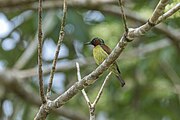
_(1).jpg/180px-Flickr_-_Rainbirder_-_Mouse-brown_Sunbird_(Anthreptes_gabonicus)_(1).jpg)
.jpg/180px-Western_Violet-backed_Sunbird%2C_Sakania%2C_DRC_(12044306845).jpg)


_3_(cropped).jpg/180px-Little_green_sunbird_(Anthreptes_seimundi_kruensis)_3_(cropped).jpg)






_male.jpg/144px-Príncipe_sunbird_(Anabathmis_hartlaubii)_male.jpg)

.jpg/180px-Dreptes_thomensis_12933301_(cropped).jpg)

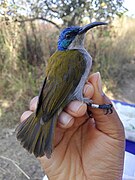


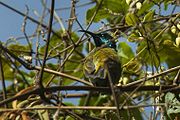


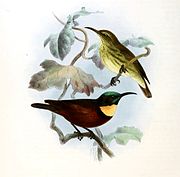


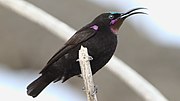



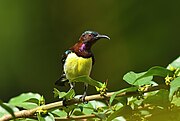

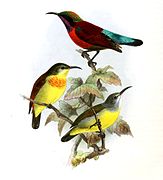
.jpg/180px-Leptocoma_brasiliana_178002430_(cropped).jpg)

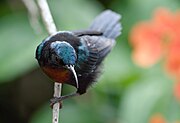

_(cropped).jpg/180px-Sunbird_(8209000171)_(cropped).jpg)
.jpg/180px-Tacazze_Sunbird%2C_Ngorongoro_Crater_(8494806649).jpg)
_male.jpg/111px-Bronze_Sunbird_(Nectarinia_kilimensis)_male.jpg)
.jpg/128px-Malachite_Sunbird%2C_Nectarinia_famosa%2C_at_Kloofendal_Nature_Reserve%2C_Johannesburg%2C_South_Africa._(21380384575).jpg)

_-Kenya.jpg/180px-Golden-winged_Sunbird_(Drepanorhynchus_reichenowi)_-Kenya.jpg)


.jpg/146px-Cinnyris_manoensis_(cropped).jpg)
.jpg/141px-Lesser_Double-collared_Sunbird_-_Cinnyris_chalybeus_(49088533437).jpg)

.JPG/180px-Ruwenzori_Double-collared_Sunbird_(cropped).JPG)

_male.jpg/180px-Northern_double-collared_sunbird_(Cinnyris_reichenowi_preussi)_male.jpg)
.jpg/180px-Kirstenbosch_National_Botanical_Garden%2C_Cape_Town%2C_South_Africa_(Unsplash).jpg)

.jpg/180px-Eastern_Double-collared_Sunbird%2C_Ngorongoro_Crater_(8494806979).jpg)
.jpg/180px-Cinnyris_fuelliborni_Gronvold_(cropped).jpg)


.jpg/180px-Cinnyris_mariquensis_(45925462772).jpg)
.jpg/180px-Cinnyris_shelleyi_shelleyi%2C_Caprivi%2C_Birding_Weto_Tours%2C_a_(cropped).jpg)


.jpg/180px-Purple-banded_Sunbird_(Cinnyris_bifasciatus).jpg)
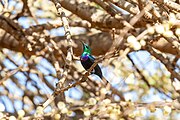
.jpg/180px-Pemba_Sunbird%2C_Manta_Resort%2C_Pemba_Island_(8494780065).jpg)
.jpg/180px-Orange-tufted_Sunbird_(cropped).jpg)
_male.jpg/180px-Palestine_sunbird_(Cinnyris_osea_osea)_male.jpg)


_male.jpg/180px-Splendid_sunbird_(Cinnyris_coccinigastrus)_male.jpg)


.jpg/180px-Cinnyris_oustaleti%2C_Anthreptes_rectirostris_tephrolaema_Keulemans_(cropped).jpg)

_male.jpg/180px-Variable_sunbird_(Cinnyris_venustus_venustus)_male.jpg)
_male.jpg/180px-Dusky_sunbird_(Cinnyris_fuscus)_male.jpg)

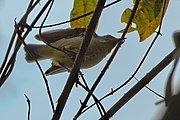



.jpg/180px-Apricot-breasted_Sunbird_(cropped).jpg)
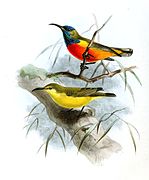
_male.jpg/180px-Souimanga_sunbird_(Cinnyris_sovimanga_apolis)_male.jpg)
.jpg/180px-Malagasy_green_sunbird_(Cinnyris_notatus).jpg)


_(cropped).jpg/167px-A_monograph_of_the_Nectariniidae%2C_or%2C_Family_of_sun-birds_(6431109531)_(cropped).jpg)
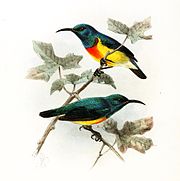
.jpg/180px-Loten%27s_Sunbird_SM_(cropped).jpg)
.jpg/180px-Grey-hooded_Sunbird_(cropped).jpg)
.jpg/180px-Mount_Apo_Sunbird_1_(cropped).jpg)
.jpg/180px-Lina%27s_Sunbird_(cropped).jpg)



.jpg/180px-Aethopyga_jeffreyi_Keulemans_(cropped).jpg)

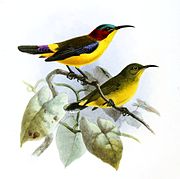




_male.jpg/180px-White-flanked_Sunbird_(Aethopyga_eximia)_male.jpg)

.jpg/144px-Black-throated_Sunbird_(8249229694).jpg)
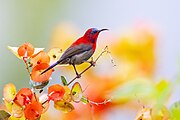


.jpg/163px-Aethopyga_mystacalis_102189_(cropped).jpg)

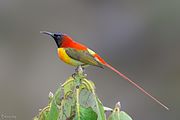
.jpg/180px-Purple-naped_Sunbird_(15026356712).jpg)

.jpg/180px-Arachnothera_flammifera_Keulemans_(cropped).jpg)



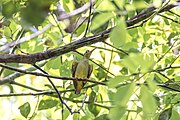



.jpg/180px-Streaky-breasted_Spiderhunter_-_Carita_-_West_Java%2C_Indonesia_(cropped).jpg)


